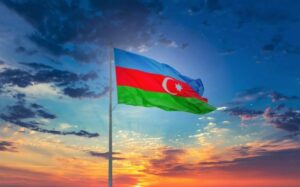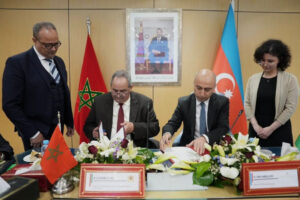New Evidence Presented in Court Confirms Armenian Armed Forces’ Chief of General Staff’s Involvement in Occupation of Azerbaijani Territories

Baku, The Gulf Observer: The Baku Military Court on Thursday resumed an open session in the high-profile criminal case involving former leaders of the separatist regime in Azerbaijan’s Karabakh region, including Arayik Harutyunyan, Arkadi Ghukasyan, Bako Sahakyan, Davit Ishkhanyan, David Babayan, Levon Mnatsakanyan, and others. The defendants face a series of grave charges stemming from Armenia’s military aggression against Azerbaijan.
Presided over by Judge Zeynal Aghayev, with Judges Jamal Ramazanov and Anar Rzayev (alternate judge Gunel Samadova), the court proceedings continued with full adherence to legal protocols. The accused were provided with defense counsel and interpretation services in their native language. The session was attended by the defendants, their legal representatives, state prosecutors, and some victims and their legal successors.
Among the key developments, defendant Levon Mnatsakanyan admitted his direct involvement in the military occupation of Azerbaijani territories. He confirmed serving in various command roles—battalion commander, division commander, and artillery chief—in the so-called separatist entity. Questioned by state prosecutor Fuad Musayev, Mnatsakanyan acknowledged his participation in operations across several regions, including Aghdam, Jabrayil, Aghdara, and Fuzuli.
The court also examined video evidence revealing the participation of foreign nationals in the occupation of Azerbaijani territories as members of the “Shusha Separate Battalion”. Established on November 5, 1991, the battalion reportedly included more than 210 individuals—Dashnaks and volunteers—from the United States, Canada, Syria, and Armenia. Footage showed members engaging in military operations and honoring figures associated with the occupation.
One prominent figure shown in the evidence was Jirayr Sefilyan, a Beirut-born Armenian who led the Shusha battalion and played a central role in the occupation of Karabakh. Sefilyan’s battalion, formed from “Dashnaktsutyun” combat groups, is said to have been involved in major battles, including those in Aghdam. He later served as commander of the 6th defense district from 1997 to 1998 and was decorated with military honors by Armenia.
The footage also included statements from Movses Hakobyan, former Chief of the General Staff of Armenia, who described the involvement of Armenian forces in offensives across multiple Azerbaijani regions, including Garakhanbayli, Asgaran, Shusha, Khojavand, Kalbajar, and Zangilan.
Several defendants, including David Manukyan and David Babayan, were shown in videos identifying themselves and confirming participation in the occupation operations. Manukyan stated that foreign participants in their battalion were not mercenaries but individuals driven by ideology.
In a noteworthy exchange, Arayik Harutyunyan denied direct involvement in combat due to health issues, though he admitted overseeing the weapons depot of the 8th regiment, which was active in nearly all major operations. He named Samvel Karapetyan as the commander of the regiment and provided insights into their planning, including operations in Shusha.
Presented with footage showing him alongside Karapetyan on a tank, Harutyunyan attempted to distance himself from previous televised statements, asserting he spoke on behalf of his brother. He nonetheless identified himself in various photographs and acknowledged attending meetings with Armenian officials and former separatist leaders.
Harutyunyan responded to inquiries from Assistant Prosecutor General Tugay Rahimli regarding the lack of implementation of United Nations Security Council resolutions, claiming internal disagreement and a lack of clarity on the matter. He confirmed seeking negotiations with Azerbaijan and discussing the UN resolutions with Armenian Prime Minister Nikol Pashinyan during his tenure as the separatist leader in 2020.
Regarding the destruction of Azerbaijani cemeteries during the occupation, Harutyunyan described such acts as “barbarism.”
David Babayan declined to answer questions about which forces were referenced as “occupants” in the UN Security Council resolutions. Meanwhile, Arkadi Ghukasyan’s defense attorney filed for substitution due to health concerns, a request granted by the court, which subsequently forwarded the decision to the Bar Association of Azerbaijan.
Throughout the hearing, the defendants also responded to questions from their legal defenders and victim representatives.
The next court session is scheduled for May 26.
Charges and Legal Proceedings
The defendants — Arayik Vladimiri Harutyunyan, Arkadi Arshaviri Ghukasyan, Bako Sahaki Sahakyan, Davit Rubeni Ishkhanyan, David Azatini Manukyan, Davit Klimi Babayan, Levon Henrikovich Mnatsakanyan, Vasili Ivani Beglaryan, Erik Roberti Ghazaryan, Davit Nelsoni Allahverdiyan, Gurgen Homeri Stepanyan, Levon Romiki Balayan, Madat Arakelovich Babayan, Garik Grigori Martirosyan, and Melikset Vladimiri Pashayan — are facing a litany of charges under Azerbaijan’s Criminal Code.
These include, but are not limited to:
- Article 100 (planning, preparing, initiating, and waging a war of aggression)
- Article 103 (genocide)
- Article 105 (extermination of the population)
- Article 107 (deportation or forced displacement of population)
- Article 214 (terrorism)
- Article 214-1 (financing terrorism)
- Article 278 (forcible seizure and retention of power)
- Article 279 (creation of illegal armed groups)
- Article 115-116 (violations of international humanitarian law during armed conflict)
- Article 277 (assassination of a state official or public figure)
The court proceedings remain ongoing, with public interest high amid the broader context of post-conflict justice and accountability in the region.

